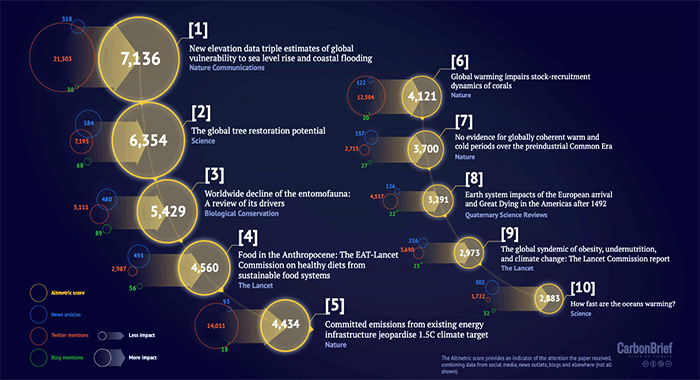
CSTPR’s MeCCO work for Lancet Report (#12 most featured in the media) highlighted in Carbon Brief
Last year saw the rise of climate change protests, with Greta Thunberg, school strikes and Extinction Rebellion generating global news coverage.
The impacts of climate change and extreme weather also hit many newspaper frontpages over the past 12 months, from devastating fires in both the Amazon and Australia to Greenland’s melting ice sheet.
Amidst an extraordinary year for media coverage of climate change, scientists and researchers were busily publishing thousands of peer-reviewed journal papers on their latest findings.
These were reported around the world in news articles and blogs and shared on social media platforms, such as Twitter, Facebook, LinkedIn and Reddit. Tracking all these “mentions” was Altmetric, an organisation that scores and ranks papers according to the attention they receive. (Full details of how the Altmetric scoring system works can be found in an earlier article.)
Using Altmetric data for 2019, Carbon Brief has compiled its annual list of the 25 most talked-about climate change-related papers that were published the previous year. The infographic above shows which ones made it into the Top 10.
Number one
According to Altmetric, the two highest-scoring climate papers in 2019 are commentaries. These are “World scientists’ warning of a climate emergency” in the journal BioScience, with a score of 10,950, and “Climate tipping points – too risky to bet against” in Nature, which scored 8,552.
The two papers were the third and fifth highest-scoring, respectively, of any “research outputs” published in 2019.
The BioScience “viewpoint” piece declares “clearly and unequivocally that planet Earth is facing a climate emergency”. The paper has five authors, but it was the 11,258 scientist signatories from 153 countries that particularly attracted media attention.
The Nature “comment” paper has a similarly stark message, warning that “evidence from tipping points alone suggests that we are in a state of planetary emergency: both the risk and urgency of the situation are acute”.
Despite their high scores, as they are commentaries rather than research papers, they are not included in Carbon Brief’s leaderboard. (Commentaries are typically commissioned by journal editors, rather than being part of an open submission process. They are also not routinely peer-reviewed. Carbon Brief does include review and perspective articles in the leaderboard, however, as these tend to follow a more traditional editorial process, though this varies by journal. For more on the different types of journal articles, see the guidelines given by Nature and Science as examples.)
Landing the coveted number one spot in 2019 is “New elevation data triple estimates of global vulnerability to sea level rise and coastal flooding”, published in Nature Communications in October, with an Altmetric score of 7,136. This paper was placed seventh in Altmetric’s own Top 100 research papers of 2019.
The Top 5
Just missing out on top spot, in second place is “The global tree restoration potential” in the journal Science, with an Altmetrics score of 6,354.
This study, led by Dr Jean-Francois Bastin – a postdoctoral researcher at the Crowther Lab at ETH Zurich – mapped “the global potential tree coverage to show that 4.4bn hectares of canopy cover could exist under the current climate”. The study estimates that there is “room for an extra 0.9bn hectares” of trees, which has the potential to store 205bn tonnes of carbon.
Elsewhere in the Top 25
Just outside the Top 10, in 11th place with a score of 2,767, is the Science Advances paper “Acceleration of ice loss across the Himalayas over the past 40 years”. Using satellite imagery, the study finds a “doubling of the average loss rate” of Himalayan ice during 2000-16 compared to 1975-2000. The study featured in 349 news stories – more than any other in the list outside the Top 4.
In 12th is another Lancet paper, with the longest title of any in the Top 25: “The 2019 report of The Lancet Countdown on health and climate change: ensuring that the health of a child born today is not defined by a changing climate”.
The Lancet Countdown is an “international, multidisciplinary collaboration, dedicated to monitoring the evolving health profile of climate change, and providing an independent assessment of the delivery of commitments made by governments worldwide under the Paris Agreement”. Carbon Brief reported on the 2018 edition of the report, which warned that extreme heat threatens “systemic failure” of the world’s hospitals. Read more …

